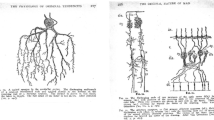Abstract
Byrnes and Fox present a thoughtful article on a neglected but important topic for educational psychologists. Some major contributions are their emphasis on the need for consistency in educational theory and neuroscience research, the lack of automatic correspondence between neuroscience research and educational applications, the need for educator awareness of neuroscience research, the importance of development, and the influence of early education. Limitations of the neuroscience perspective for education include inadequate examination of contemporary theories of learning and motivation, the generality of cognitive processes, the influence of student beliefs, and the role of self-regulation. Suggestions for future research are given.
Similar content being viewed by others
REFERENCES
Adams, M. J. (1990). Beginning to read, Harvard University Press, Cambridge, MA.
Bandura, A. (1986). Social foundations of thought and action: A social cognitive theory, Prentice Hall, Englewood Cliffs, NJ.
Bandura, A. (1988). Self-regulation of motivation and action through goal systems. In Hamilton, V., Bower, G. H., and Frijda, N. H. (eds.), Cognitive perspectives on emotion and motivation, Kluwer Academic Publishers, Dordrecht, The Netherlands, pp. 37–61.
Bandura, A. (1997). Self-efficacy: The exercise of control. Freeman, New York.
Bruner, J. S. (1960). The process of education. Vintage, New York.
Byrnes, J. P.,Fox, N. A. (1998). The educational relevance of research in cognitive neuroscience. Educ. Psychol. Rev. 10: 297–342.
Eccles, J., Midgley, C., Wigfield, A., Buchanan, C., Reuman, D., Flanagan, C., and MacIver, D. (1993). Development during adolescence: The impact of stage-environment fit on young adolescents' experiences in schools and families. Am. Psychol. 48: 90–101.
Gredler, M. E. (1992). Learning and instruction: Theory into practice (2nd Ed.), Macmillan, New York.
Hohn, R. L. (1995). Classroom learning and teaching. Longman, White Plains, NY.
Locke, E. A., and Latham, G. P. (1990). A theory of goal setting and task performance, Prentice Hall, Englewood Cliffs, NJ.
Meece, J. L. (1991). The classroom context and students' motivational goals. In Maehr, M. L., and Pintrich, P. R. (eds.), Advances in motivation and achievement (Vol. 7), JAI Press, Greenwich, CT, pp. 261–285.
Ormrod, J. E. (1995). Human learning (2nd Ed.), Merrill, Englewood Cliffs, NJ.
Pintrich, P. R. (1989). The dynamic interplay of student motivation and cognition in the college classroom. In Ames, C., and Maehr, M. L. (eds.), Advances in motivation and achievement (Vol. 6), JAI Press, Greenwich, CT, pp. 117–160.
Pintrich, P. R., Marx, R. W., and Boyle, R. (1993). Beyond “cold” conceptual change: The role of motivational beliefs and classroom contextual factors in the process of conceptual change. Rev. Educ. Res. 63: 167–199.
Pintrich, P. R., and Schrauben, B. (1992). Students' motivational beliefs and their cognitive engagement in classroom tasks. In Schunk, D. H., and Meece, J. L. (eds.), Student perceptions in the classroom Lawrence Erlbaum Associates, Hillsdale, NJ, pp. 149–183.
Pintrich, P. R., and Schunk, D. H. (1996). Motivation in education: Theory, research, and applications. Merrill, Englewood Cliffs, NJ.
Schunk, D. H. (1989). Self-efficacy and achievement behaviors. Educ. Psychol. Rev. 1: 173–208.
Schunk, D. H. (1990). Goal setting and self-efficacy during self-regulated learning. Educ. Psychol. 25: 71–86.
Schunk, D. H. (1991). Self-efficacy and academic motivation. Educ. Psychol. 26: 207–231.
Schunk, D. H. (1996). Learning theories: An educational perspective (2nd Ed.), Merrill, Englewood Cliffs, NJ.
Schunk, D. H., and Hanson, A. R. (1985). Peer models: Influence on children's self-efficacy and achievement. J. Educ. Psychol. 77: 313–322.
Schunk, D. H., and Hanson, A. R. (1989). Self-modeling and children's cognitive skill learning. J. Educ. Psychol. 81: 155–163.
Weinstein, C. E., and Mayer, R. E. (1986). The teaching of learning strategies. In Wittrock, M. C. (ed.), Handbook of research on teaching (3rd Ed.), Macmillan, New York, pp. 315–327.
Zimmerman, B. J. (1989). A social cognitive view of self-regulated academic learning. J. Educ. Psychol. 81: 329–339.
Zimmerman, B. J. (1994). Dimensions of academic self-regulation: A conceptual framework for education. In Schunk, D. H., and Zimmerman, B. J. (eds.), Self-regulation of learning and performance: Issues and educational applications, Lawrence Erlbaum Associates, Hillsdale, NJ, pp. 3–21.
Author information
Authors and Affiliations
Rights and permissions
About this article
Cite this article
Schunk, D.H. An Educational Psychologist's Perspective on Cognitive Neuroscience. Educational Psychology Review 10, 411–417 (1998). https://doi.org/10.1023/A:1022841401896
Issue Date:
DOI: https://doi.org/10.1023/A:1022841401896




